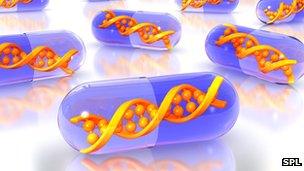Gene therapy nears approval in Europe
- Published

Gene therapies alter a patient's DNA
Europe is on the cusp of approving a gene therapy for the first time, in what would be a landmark moment for the field.
Gene therapies alter a patient's DNA to treat inherited diseases passed from parent to child.
<link> <caption>The European Medicines Agency has recommended</caption> <url href="http://www.ema.europa.eu/ema/index.jsp?curl=pages/news_and_events/news/2012/07/news_detail_001574.jsp&mid=WC0b01ac058004d5c1" platform="highweb"/> </link> a therapy for a rare genetic disease which leaves people unable to properly digest fats.
The European Commission will now make the final decision.
The idea of gene therapy is simple: if there is a problem with part of a patient's genetic code then replace that part of the code.
The reality has not been so easy. In one gene therapy trial a US teenager, Jesse Gelsinger, died, and other patients have developed leukaemia.
There are no gene therapies available outside of a research lab in Europe or the US.
Gene change
The European Medicines Agency's Committee for Medicinal Products for Human Use has considered the use of Glybera to treat lipoprotein lipase deficiency.
One in a million people have the deficiency. They have damaged copies of a gene which is essential for breaking down fat.
It leads to fat building up in the blood, abdominal pain and life-threatening pancreatitis (inflammation of the pancreas).
The only way to manage the condition is by having a very low-fat diet.
The therapy uses a virus to infect muscle cells with a working copy of the gene.
It was recommended for patients with severe pancreatitis, who cannot control the disease through diet.
'Afraid of a normal meal'
The manufacturer, UniQure, said the decision was a "major breakthrough" for patients and medicine as a whole.
UniQure chief executive officer Jorn Aldag said: "Patients with lipoprotein lipase deficiency are afraid of eating a normal meal because it can lead to acute and extremely painful inflammation of the pancreas, often resulting in a visit to intensive care.
"Now, for the first time, a treatment exists for these patients that not only reduces this risk of getting severely sick, but also has a multi-year beneficial effect after just a single injection.
"Restoring the body's natural ability to break down fat particles in the blood, in order to prevent pancreatitis and excruciating abdominal pain suffered by patients, is what gene therapy is all about: curing disease at the genetic level."
Dr Tomas Salmonson, from the agency's Committee, said the use of Glybera should be restricted to patients "with greatest need".
China was the first country to <link> <caption>officially sanction a gene therapy</caption> <url href="http://www.nature.com/nbt/journal/v22/n1/full/nbt0104-3.html" platform="highweb"/> </link> .
- Published27 October 2011
- Published17 March 2011
- Published13 October 2011
- Published13 October 2011